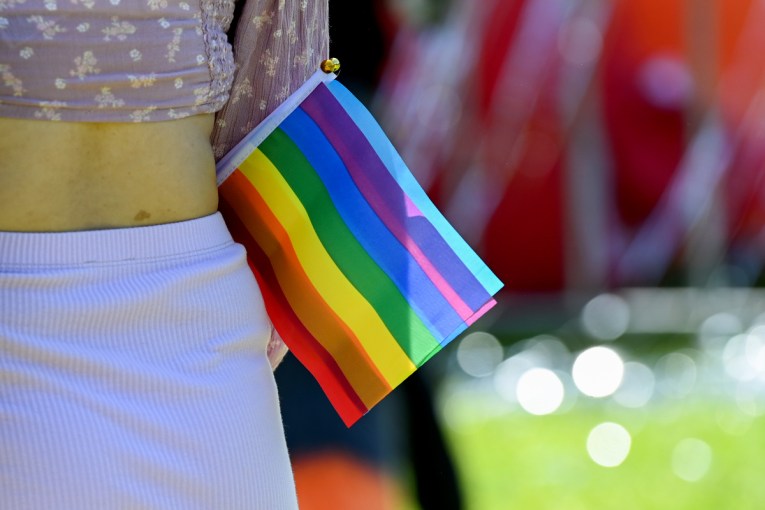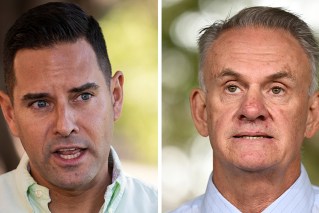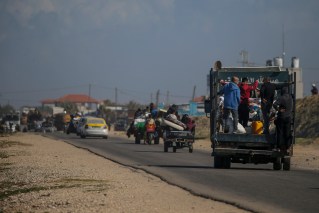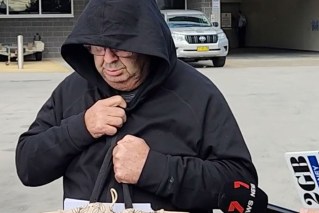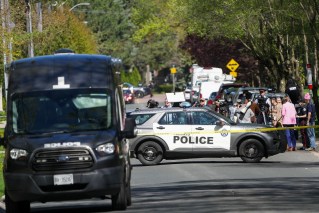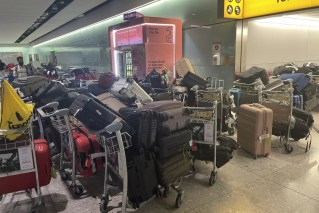NATO Secretary-General Jens Stoltenberg says Russia might be laying the propaganda justification to unleash chemical weapons in Ukraine.
“In recent days, we have heard absurd claims about chemical and biological weapons laboratories,” Stoltenberg was quoted as saying, adding that the Kremlin was inventing false pretexts to justify its own genuine war crimes.
“Now that these false claims have been made, we must remain vigilant because it is possible that Russia itself could plan chemical weapons operations under this fabrication of lies. That would be a war crime,” Stoltenberg was quoted as saying.
Such a move would be a war crime, Stoltenberg told German newspaper Welt am Sonntag.
He added that although the Ukrainian people were resisting the Russian invasion with courage, the coming days are likely to inflict even greater hardship on the embattled nation.
Ukraine’s President Volodymyr Zelensky says about 1300 of his nation’s troops have been killed since the start of the invasion, but he claims Russia has suffered “ten times” the losses.
The numbers are unverified and Western sources have put Russia’s dead at about 6,000, according to the BBC.
Mr Zelensky was addressing the media on day 17 as fighting was intensifying just outside the capital Kyiv and Ukraine’s military said Russia had captured the eastern outskirts of the besieged city of Mariupol.
Mayor held captive
He called for the release of the mayor of Melitopol, Ivan Fedorov, whose kidnapping by Russian forces was captured on CCTV, triggering thousands of Ukrainians to protest on the city’s streets.
“The detention of the mayor of Melitopol is a crime against democracy,” said Mr Zelensky.
“They’ve killed one mayor and now they capture another one. Meaning that all the mayors, no matter which cities the Russian forces enter, if they do not confirm their collaboration, they are being killed.
“This is simple terrorism.”

Ukrainian soldiers mourn three of their own at a funeral. Photo: Getty
In overnight developments:
- There are reports of looting and violent confrontations among desperate civilians over dwindling basic supplies in Mariupol, according to the UN Office for the Coordination of Humanitarian Affairs.
- Russian forces shelled a mosque in Mariupol, where more than 80 adults and children, including Turkish citizens, had taken refuge, Ukraine’s foreign ministry said.
- The governors of two Ukrainian regions, Kyiv and Donetsk, said Russian attacks were continuing in areas Ukraine was trying to evacuate and bring aid through humanitarian corridors.
- German Chancellor Olaf Scholz and French President Emmanuel Macron called for an immediate ceasefire during a phone call with Russian President Vladimir Putin, a German government spokesperson said.
- Volodymyr Zelensky said the US and its allies should be more involved in negotiations to end the war but welcomed efforts by Israeli Prime Minister Naftali Bennett to mediate between Ukraine and Russia
- Ukraine’s neighbours reported a dip in numbers of refugees as governments and volunteers struggled to find shelter for the nearly 2.6 million people who have fled.
- Belarus said it had no plans to join Russian forces in Ukraine but was sending five battalion tactical groups to its border on rotation to replace forces already stationed there, its Chief of General Staff Viktor Gulevich said.*
- Italian police seized a superyacht owned by Russian billionaire Andrey Igorevich Melnichenko, the prime minister’s office said, a few days after the businessman was placed on an EU sanctions list.
Fighting rages outside Kyiv
Ukraine has pleaded for Russia to observe a ceasefire to allow civilian evacuation from besieged cities, as fighting rages northwest of the capital Kyiv.
The bulk of Russian ground forces are 25km from the centre of the Ukrainian capital, while several other cities are encircled and under heavy shelling, the UK defence ministry says.
Kyiv’s mayor, former heavyweight boxing champion Vitali Klitschko, said the capital had enough essential supplies to last a couple of weeks. Supply lines remained open.
Ukraine’s Deputy Prime Minister Iryna Vereshchuk said she hoped several humanitarian corridors would open on Saturday for thousands of residents in the bombarded cities, including from the besieged port city of Mariupol to Zaporizhzhia.
“I hope that the day will go well, all the planned routes will be open and Russia will fulfil its obligations to guarantee the ceasefire regime,” Ms Vereshchuk said in a video address after repeated evacuation efforts this week failed.

The front line in the city of Irpin, northern Ukraine. Photo: Getty
At least 1582 civilians in the southeastern city of Mariupol have been killed as a result of Russian shelling and a 12-day blockade, the city council said. It was not possible to verify casualty figures.
Air raid sirens blared across most Ukrainian cities on Saturday morning urging people to seek shelters, after Mr Zelensky said the war had reached a “strategic turning point”.
“It is impossible to say how many days we still have (ahead of us) to free Ukrainian land. But we can say we will do it,” he said.
“We are already moving towards our goal, our victory.”
Britain’s intelligence update said Russian ground forces were still making only limited progress, hampered by logistical problems and Ukrainian resistance.
Ukrainian family lands in Sydney

Ukrainian-Australian Olha Lyeskakova gives an emotional welcome to her mother Olena, sister Iryna and young niece Oksana. Photo: AAP
A Ukrainian family, initially barred from flying to Australia because their nine-month-old baby did not have a passport, has finally arrived in Sydney.
Iryna Zaiets fled Ukraine with her mother Olena Kuzmych and little Oksana when the Russian invasion began on February 24
They have found safe haven in Australia after a dangerous three-week journey in which they were prevented from boarding a flight to Sydney.
.
Ms Zaiets’ sister Olha Lyeskakova cried as she met them at Sydney Airport on Saturday, embracing her sister and mother, and seeing her baby niece Oksana for the first time.
“I have done for Oksana more than I have done for anyone in my life before these last two weeks,” she told AAP.
“I am very happy that she is here and she won’t remember the war.”
The family had escaped to Poland and secured visas and flights to Sydney, but when they went to board a flight at the start of March, they were not allowed to board, because Oksana did not have any travel documents.
Ms Lyeskakova battled authorities in three countries for a fortnight to solve the problem, as her sister and mother gradually gave up hope that they would be able to make it to Australia.
“It’s a big relief. I was very stressed, it was such a long journey to get them here,” she said.
Ms Lyeskakova said her sister, visiting Australia for the first time, is so far in awe.
“She is so impressed, even by the air and the sky — she is very excited to be here.”
The family has not yet had time to rest, and is spending the day moving furniture in Ms Lyeskakova’s house, to make room for the new arrivals.
It’s expected they will stay for nine months or so, depending on immigration rules.
There were half a dozen other Ukrainians fleeing the conflict on Saturday’s Emirates flight to Sydney, and Ms Lyeskakova believes there are hundreds more people granted Australian visas who are facing similar problems with travel documents.
The Department of Home Affairs said it was prioritising visa applications for Ukrainians, and all Ukrainian nationals already in Australia whose visas expired by June 30 would receive an automatic six-month extension.
-with AAP

